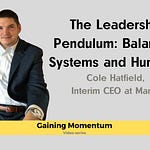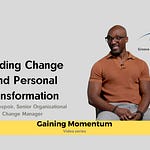It's curious—and perhaps telling—that discussing humanity in the workplace still feels radical. Many workplaces operate as though employees become fundamentally different people when they step through the office door, reminiscent of the eerie separation depicted in the TV series Severance, where workers' identities are strictly divided between professional and personal lives. Why does bringing our full humanity to work remain so controversial?
Organizations typically measure success in purely numeric terms—KPIs, performance metrics, and productivity scores. Employees often become passive data points on strategic maps, instruments used rather than empowered agents. Denise Cooper, an executive coach and seasoned HR leader, offers a compelling alternative: true organizational high performance isn't achieved by focusing solely on metrics, but by empowering individuals to become active creators of their organizational realities.
This empowerment isn't merely philosophical; it’s practical. It means fostering genuine agency within teams, allowing employees to actively shape solutions and innovations. Denise has consistently demonstrated that when organizations embrace human empowerment—such as shifting HR from a cost management function to a value-creating partner or encouraging workers to proactively address safety and operational concerns—performance thrives sustainably.
Empowered mentorship, distributed leadership, and value-driven HR illustrate the tangible impacts of inviting the full human experience into the workplace. Leaders who create environments where curiosity, autonomy, and individual responsibility are encouraged unlock the deepest levels of commitment and innovation.
Yet, recognizing humanity at work remains disruptive in many organizational cultures. It challenges traditional beliefs about hierarchy, authority, and control. Perhaps, the unease we feel when discussing humanity in business reflects our unspoken recognition that the workplace needs to evolve beyond mechanical views of productivity.
It's time to ask ourselves openly: Why is it controversial to bring the fullness of our humanity to work? What would it look like to empower people not merely as instruments of production, but as true co-creators in organizational success? The answers could redefine high performance in profoundly human terms.
Empowerment in Action
From Cost Control to Value Creation
Organizations traditionally position Human Resources as gatekeepers focused primarily on controlling costs—managing hiring budgets, benefits expenses, and turnover rates. Denise Cooper challenges this limiting view by repositioning HR as an active partner in organizational growth. In one notable case involving a call center, Denise shifted the conversation from simply managing hiring costs to actively investing in enhanced training and improved hiring practices. By reducing onboarding time from six weeks to four weeks, Denise and her team directly contributed to a $2.3 million increase in productivity and revenue. Empowering HR to view themselves as drivers of tangible business outcomes significantly transformed organizational performance.
Empowering Employees for Operational Excellence
Safety and operational efficiency often suffer under command-and-control cultures, where workers passively comply rather than proactively engage. Denise describes an innovative approach in a chemical manufacturing context where traditional punitive measures failed to reduce accidents. Instead, employees were actively encouraged to report "near misses," incidents narrowly avoided through chance. By reframing safety reporting as proactive care rather than blame avoidance, workers felt empowered to protect themselves and their colleagues. This shift towards empowerment drastically reduced safety incidents, proving that genuine employee engagement enhances both morale and operational effectiveness.
Structured Mentorship: From Answers to Curiosity
Traditional mentorship models often center around mentors as repositories of answers, with mentees passively absorbing knowledge. Denise advocates for a radical shift—structured mentorship driven by curiosity, co-creation, and mutual discovery. Effective mentors, in her view, don't simply provide solutions; they facilitate powerful inquiry and independent problem-solving. This approach transforms mentorship into a dynamic partnership, empowering mentees to confidently explore and innovate rather than merely following prescribed advice. Structured mentorship thus becomes an engine for sustainable organizational learning and innovation, deeply rooted in individual empowerment.
Distributed Leadership & Collective Agency
Leadership as Environment Creation
True leadership goes beyond personal authority or positional power; it involves creating environments where every individual feels empowered to step into leadership roles. Denise Cooper emphasizes that genuine leadership sets conditions for distributed agency—encouraging team members to actively contribute, innovate, and take ownership of organizational outcomes. Effective leaders don't simply direct; they cultivate spaces where responsibility and creativity naturally thrive.
This shift from hierarchical control to distributed leadership profoundly impacts organizational performance. When team members see themselves as integral participants rather than passive executors, their motivation and productivity increase exponentially. Denise’s perspective challenges traditional top-down paradigms, underscoring the power of environments that inspire collective ownership.
Cultivating Empowered Teams
How can leaders practically build such empowering environments? Denise recommends several key strategies:
Encourage Active Participation: Invite team members to contribute meaningfully to decision-making processes, explicitly valuing their input. Active participation cultivates a sense of ownership and responsibility among team members.
Create Safe-to-Fail Spaces: Foster cultures where experimentation is encouraged, and failure is viewed as a vital learning opportunity. Safe-to-fail spaces empower individuals to innovate without fear, increasing agility and resilience.
Promote Transparent Communication: Openly share information and decision rationales. Transparency builds trust and empowers team members with the context they need to make informed contributions.
Model Curiosity and Openness: Leaders should demonstrate continuous learning and curiosity, openly acknowledging when they don't have all the answers. This behavior creates permission for others to embrace learning and exploration as essential components of their roles.
Recognize Collective Success: Celebrate team achievements and acknowledge the contributions of individuals at all levels. Recognizing collective efforts reinforces the idea that success is a shared, collaborative endeavor rather than an individual pursuit.
By embedding these approaches into everyday organizational practices, leaders can foster genuine distributed leadership and collective agency, unlocking deeper levels of innovation, satisfaction, and sustainable high performance.
Practical Steps for Human-Centric Leadership
Implementing a genuinely human-centric approach to high performance requires deliberate and practical action. Leaders and organizations can immediately adopt several key practices:
Begin with Pilot Projects: Initiate change with small, manageable teams or projects. This allows for focused experimentation, learning, and demonstrable successes that build momentum.
Shift Measurement Frameworks: Transition from purely quantitative metrics to qualitative assessments emphasizing behavior alignment, learning, and innovation. Regularly evaluate team dynamics, collaboration effectiveness, and individual empowerment as indicators of true organizational health.
Normalize Vulnerability and Learning: Encourage leaders and team members to openly acknowledge uncertainty and mistakes as part of the growth process. Creating safe environments for vulnerability reduces fear-based behaviors and promotes authentic engagement and risk-taking.
Foster Active Curiosity: Encourage questioning and exploration at every organizational level. Mentors, managers, and leaders should regularly ask powerful, curiosity-driven questions that inspire reflection, innovation, and deeper problem-solving capabilities among team members.
Regularly Share Human Stories: Embed personal narratives and genuine stories within organizational communication. Human stories strengthen emotional connections and reinforce the shared purpose, bridging the gap between individual experiences and collective goals.
Embracing Our Full Humanity at Work
Reflecting again on the paradox introduced earlier, the notion of embracing our full humanity at work still remains surprisingly radical.
Yet, recognizing and honoring humanity in organizational cultures often encounters resistance not because it's objectively impossible, but because of perceived short-term risks and pressures. Traditional business environments, driven by fear cultures, overwhelming stress, immediate result pressures, and resource scarcity, often leave little space for humanity and creativity. Managers focus on immediate outcomes to secure bonuses; shareholders demand quick profits, neglecting sustainable purposes or healthier work environments.
However, as Denise Cooper demonstrates, leadership fundamentally shapes these environments. True leadership involves a willingness to accept short-term risks for the promise of lasting rewards. Such risks include experimenting with empowering practices, decentralizing decision-making, and genuinely engaging employees as active contributors. In the long term, these practices foster sustainable environments, deeper team buy-in, shared responsibilities, and innovative problem-solving that can even alleviate pressures and expand organizational capacities.
Crucially, true leadership extends beyond immediate organizational outcomes, enriching team members' lives and professional journeys. It creates spaces where purpose emerges authentically, allowing individuals to grow, develop transferable skills, and confidently navigate career choices—within or beyond the organization. Such empowerment enables individuals to recognize and leave truly toxic cultures, enhancing overall employability and life satisfaction.
Denise’s work shows that embracing humanity at work, even within large organizations, is indeed achievable. It requires courage, intentionality, and a commitment to true learning and authentic leadership.
Ultimately, the question becomes not whether we can afford to embrace humanity at work, but whether we can afford not to. Leaders who choose empowerment and authenticity create teams capable of extraordinary achievements, no matter the context. Are you ready to accept the short-term trade-offs to unlock lasting growth, engagement, and meaningful impact for your team?








Share this post